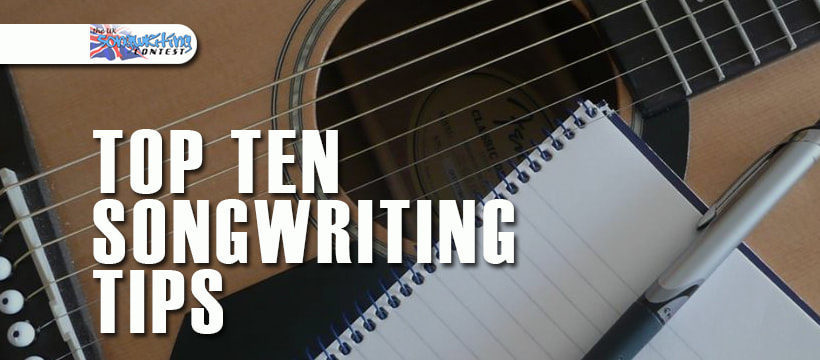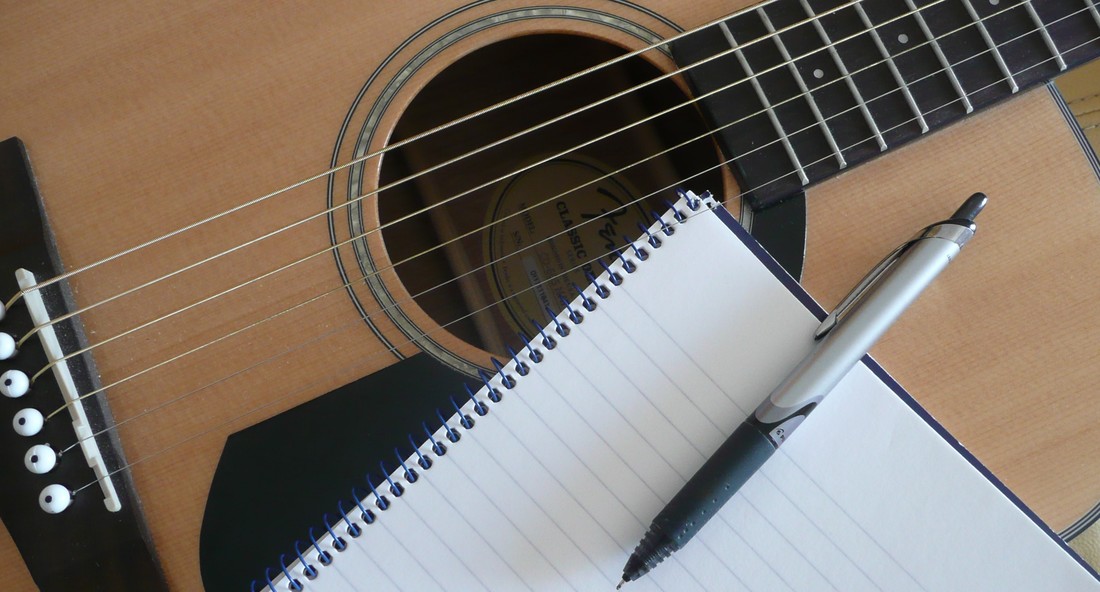Overcoming writer's block: 5 tips for songwritersAs songwriters, we know all too well the frustration of staring at a blank page or an empty recording studio, waiting for inspiration to strike. Writer's block is a common phenomenon that can affect even the most talented songwriters. The novelist Steven Pressfield likened writer's block to a dragon that needs to be slayed anew every morning. Here are a few suggestions to help overcome this obstacle and reignite your creativity.
1 - Change your environment Shaking up your surroundings can be a powerful tool in jumpstarting the creative process. If you're feeling stuck, try shifting your environment by moving to a new room, rearranging your workspace or taking the dog for a walk. A new perspective can often be the key to unlocking a fresh flow of ideas. 2 - Consistent Practice Dedicate a specific time each day to write, regardless of whether or not you're feeling motivated. Although it may sound cliché, it's true that writing is like a muscle that needs to be exercised regularly to stay strong. Creating a routine for writing can also help you to develop discipline and self-motivation. It takes discipline to sit down and write when you don't feel like it. By committing to a writing schedule, you are training yourself to be self-motivated and to push through when things get tough. 3 - Collaborate with others Collaborating with other songwriters or musicians can provide a fresh perspective and help you break through writer's block. Working with others can inspire new ideas, and the energy and enthusiasm of collaboration can be contagious. 4 - Consider AI to enhance creativity The integration of Large Language Models (LLMs) like ChatGPT has raised debates about its potential to replace human creativity with a soulless series of zeros and ones. However, some individuals are embracing the use of LLMs as a tool to enhance the creative process. Songwriters can leverage the power of AI to brainstorm ideas, develop concepts, explore chord progressions, and more. 5 - Give yourself permission to write badly Fear of writing something "bad" can be paralysing and prevent you from writing anything at all. Overcome this fear by giving yourself permission to write poorly. Set a timer for 15 minutes and write whatever comes to mind, without worrying about quality. Mark Twain famously said, "The secret of getting ahead is getting started." By allowing yourself to write freely and without judgement, you are taking the crucial first step towards crafting your next great work. Check out the songwriting tips shared by the UKSC community on our YouTube channel. If you have any tips to share, please send in a short video clip to [email protected].
0 Comments
Here are our top ten songwriting tips. These are tips that professional songwriters use, and also some of our own recommendations based on our experience and on feedback from songwriters and song contest judges.
1. Study the Classics The best way to write your own classic is to study the classics that others have already written. Choose some writers that you admire and sit down and study what they do. And ask your self these questions: What structures do they like to use? What makes the melody or lyric memorable? How did they use lyrics in the chorus and how did this relate to the verses? Analyse how they used rhyme schemes, and the order of the sections of the song. How long is the intro? Is there a hook and where does the hook appear? How is it repeated and how does it relate to the song´s subject matter and the song´s title? Read and listen to each verse. Do they all the verses lead to a main message that is found in the chorus? Answer all these questions and then apply this to your own songs. 2. Write About What You Know Pick a genre and/or subject that you are familiar and comfortable with and know about. Especially something from your own personal experience. It could also be something something you are very passionate about. This provides a natural flow and motivation. It links you and your life experience to the song in a meangingful way. It makes the song sincere and believeable and you will feel more confident writing about something you know. The more you are personally involved and connected with the subject matter, the more deeply you feel the meaning or message, the more comfortable you are with the genre and style, the more authentic the end result will be. And listeners know authenticity when they hear it. Your song will speak to them on a different level than a mechanical, contrived approach. 3. Learn Song Structure and Music Theory Lyricists need to understand song structure. They need to know what AABA and ABAB structure means. They need to know how to use metre and rhyme schemes. Music composers need to know basic music theory: at the very minimum they need to understand keys, the chords that work for each key, key changes, cadences, resolutions. This can be instinctive, without even knowing the technical terms or knowing what you are actually doing, but there must be a knowledge and understanding of these musical and structural elements to produce a worthwhile song. Songwriters never stop learning about the craft. 4. Take Notes. Often. Most well known and successful songwriters talk a lot about the notes they take. Snatches of lyric. Subject matter ideas. Hooks. A chord progression. Search for Lennon and McCartney and you will find photos of their scrawled notepad ideas. Like the successful songwriters, you should always have something available to record your songwriting ideas. And go through these notes regularly, expand on them, build on them. Use your phone, or an envelope, or a napkin, or a special notepad, or anything that is handy. Many songwriters keep a notepad and pen by their bed every night because many of our best ideas come at night and sometimes even in our dreams. If you get that great song idea, a piece of melody or lyric, when you are half asleep, it always helps to have a pen and pad next to you. Don´t go back to sleep and rely on your memory and think you will still remember in the morning. You probably won´t, and your genius idea will be gone and lost forever. 5. Rewrite A Famous Song Rewriting a well known song is always a good songwriting exercise. You can write new lyrics or a new melody to an existing song. In each case you already have the advantage of working with an existing melody or lyric, and this gives you a blueprint to work from. You could also try rewriting only parts of it - for example keep the verses but write a new chorus. Or Keep the chorus and try and write new verses that also work with that chorus. When writing a new lyric to an existing melody, or a new melody to the original lyric, make sure that you use the same amount of syllables and stress points within those syllables. Each piece must fit into place. Doing this well can create a completely new and original song. This is the basis for the Songwriting Challenge Category in The UK Songwriting Contest where contestants´ skills are tested to the limits. 6. Collaborate Some songwriters like to work on their own all the time. But most collaborate at least occasionally. Some writer´s find it much easier to write melodies and have a struggle finding words to go with them. Others only write lyrics. Others get together with their songwriting partner and share both the melody and lyrics work. Again, The UK Songwriting Contest has a special collaboration section for this. Check out the details and see how you can find your ideal partner by entering your lyric or melody. The UKSC will match up suitable lyricists and composers, put them in contact with each other and pass on work, and even professionally record selected songs. 7. Don´t be too self critical No one writes a great song every time. You probably won´t ever hear great songwriters´ disasters because they usually keep them to themselves and don´t share them. But you can be sure that even the most famous and successful songwriters have written terrible songs that are probably as bad as, or worse, than some of your own disasters. You need to accept early on that most of your efforts are not going to be Grammy winners. Especially if you are still a beginner and starting out. It takes a lot of time and practice to become good at songwriting. There will be a progression and your songs will get better - but only if you keep writing and don´t give up. Your first songs are the building blocks along the way, and you will get better with each one. Don´t be too hard on yourself. 8. Rewrite. Rewrite. Rewrite. Probably the number one basic mistake that most beginner songwriters make is that they don´t rewrite. Maybe your song came in a flash of magical inspiration and you don´t want to mess or interfere with that. Or maybe you struggled long and hard to get the verses, and they work well with the chorus, and the last thing you want to do now is go back to the beginning and change things, let only delete or rewrite entire sections. But the truth is that you really do need to do this. Or at least you need to go though the song critically and consider changing things. Listen to some of the early versions of famous songs as they developed - Beatles songs are a great source and place to see this in action because they can be easily found on YouTube and elsewhere in their very rough unfinished and early states. You can clearly see how these songs changed and grew, and how whole sections were taken out or added, and lyrics and meanings and styles changed. This is what you should also do before you actually call a song complete. Be sure to look at all possibilities before you decide it is finished. And remember that all the great songs were scrutinized and often heavily edited before they were released. 9. Network The easiest place to network is online and there are many songwriter’s forums on the internet. Some of these are much better and more useful than others, but if you find the right one it can be a good place to meet like-minded people and other songwriters. It could also be a good place for you to post your songs for opinions and maybe even critiques. The place that we recommend for UKSC entrants is, of course, our own Songwriting Community Group on Facebook. It´s a very friendly and helpful place for songwriters who enter songs in the UKSC and you will find some very knowledgeable and supportive people there - including professionals and even contest judges who sometimes pop in and follow posts. But check out all the others, do some searches, and also look closer to home and find out if there are any local songwriting groups, open mics, music clubs, theatre groups etc in your local area that you could get involved with. 10. Stay Positive Songwriting can be a very humbling thing. You are putting your baby, your personal creation, out there for others to react to. This is a brave thing to do. Remember that. But the truth is that not everyone will like a song you have written. Some will actively dislike it and even other songwriters can sometimes be hurtful when pointing out what they don´t like about it. The thing you need to always remember is: never, ever, take it personally. It is not a personal judgement. Nobody equates your songwriting with you as a person. Every great songwriter has written terrible songs. Everyone learns and develops and improves. And every song that one person loves is hated by someone else. Keep positive. Move on. Believe in yourself. Learn from constructive criticism. Take every critique and suggestion on board and learn from it, but don´t accept that it is necessarily correct or the only possible reaction. And don´t ever change yourself to suit or impress others if you want to write great songs. Take care, and best wishes from The UK Songwriting Contest Team www.songwritingcontest.co.uk LINKS: Community Group: https://facebook.com/groups/uksongwritingcontest Contest Website: https://songwritingcontest.co.uk Facebook Page: https://facebook.com/uksongwritingcontest Here is a video that is essential viewing for every songwriter! Paul McCartney is one of the biggest influences behind The UK Songwriting Contest, and in this new interview he talks about how he wrote and recorded some of his most iconic songs. We had to share this one with you because we know all songwriters will find this fascinating and will benefit from watching! In the interview Paul talks about the first song he ever wrote using the chords C, F, G and G7 and how he wrote songs together with John Lennon in the early days and how they never came away from a session without a new song. He tells us how he came up with the idea for Eleanor Rigby and how he found the name for that song character. He describes how George Harrison saved And I Love Her with a simple four note riff. He talks about how he comes up with song ideas and how he develops them, confiding that expressing his innermost personal feelings in his songs is so important. Around twenty songs are covered and there are some fascinating insights. ENTER YOUR SONGS For for the latest information, entry dates and entry forms visit songwritingcontest.co.uk SCIENCE CONFIRMS THAT SONGWRITING IS GOOD FOR YOU
The act of creative writing, and songwriting in particular, has more benefits than most people realize. The benefits are far reaching, affecting us both physically and mentally, and the interesting thing is that the quality of the writing has nothing to do with it. Just the act of writing itself leads to strong physical and mental health benefits and it doesn´t matter if anyone else reads your lyric or hears your composition, or if it is a commercial success or not. Just writing it is enough. The many benefits documented by researchers include long-term improvements in mood, reduction in stress levels, a reduction of depressive symptoms, lowered blood pressure, better lung and liver function and an improved immune system with fewer illnesses. A major study at the University of Sidney (by Karen Baikie and Kay Wilhelm) on emotional and physical health benefits of expressive writing discovered just how much time spent writing is needed to make a big difference. And its not that much. They say that although the more time spent writing the better, just 15 to 20 minutes of writing on three to five occasions over the course of their four-month study was enough to make a real and noticeable difference. Another amazing finding is that writing can even make physical wounds heal faster. A study in New Zealand found that if medical biopsy patients wrote about their thoughts and feelings for just 20 minutes for three days in a row before the biopsy their wounds healed more quickly than the people in a control group. Other studies have shown that people with asthma who write have fewer attacks than those who don't, AIDS patients who write have higher T-cell counts and cancer patients who write have more optimistic perspectives and improved quality of life. So what exactly is it about writing that makes it so good for you? Well, researchers are generally agreed that the important thing is to express your own personal, traumatic, stressful or emotional events in your writing and composing. It seems that this is the key and it is this expression of personal events and trauma that leads to improvement in physical and mental health. One well known researcher in this area is James W. Pennebaker from the University of Texas, Austin, USA. He is a leading authority on expressive writing and health and he says; "When people are given the opportunity to write about emotional upheavals they often experience improved health. They go to the doctor less. They have changes in immune function." Pennebaker and others believe that the act of expressive writing distances people from the upheaval and trauma in their lives and allows them the space to creatively step back and express and evaluate their personal dramas and tragedies. They stop obsessing unhealthily on those events and instead they focus on turning this into a positive creative outcome. This leads to lower stress levels, a more positive outlook and an improvement in general health. The good news is that you don't need to be a famous or successful songwriter to get these great benefits. You just need to write! As a songwriter you probably already know that writing songs goes deeper than, well, just writing songs. We all instinctively know when we write that there is more going on at a deeper level. But now it has been confirmed by science. Every time you write a lyric or poem that expresses your feelings and your inner self, or compose a piece of music that expresses and contains a part of you, you are acting as your own personal therapist and doing your physical and mental health a huge favour. If you are a songwriter you are certainly doing something right. Keep on writing! The International UK Songwriting Contest is now open for entries from songwriters in any country. Get full details at songwritingcontest.co.uk Best wishes, The UKSC Team |
Topics
All
Archives
July 2024
|
|
|
|




 RSS Feed
RSS Feed





